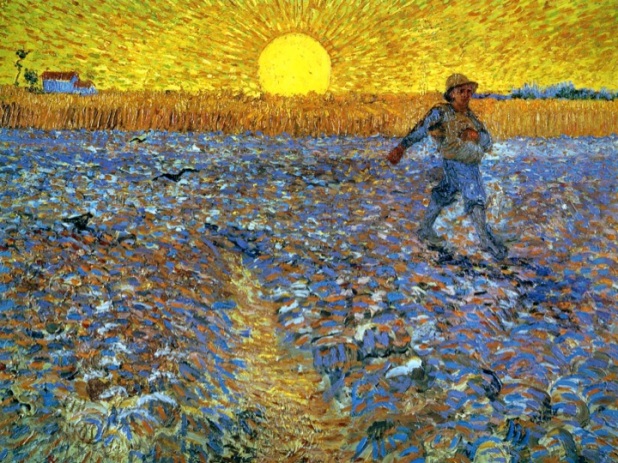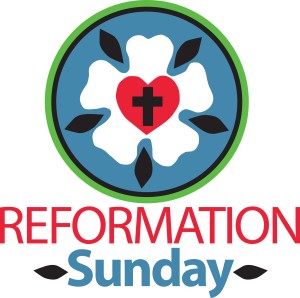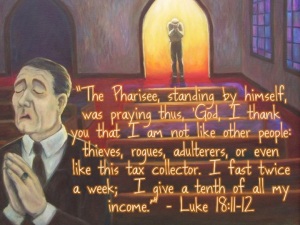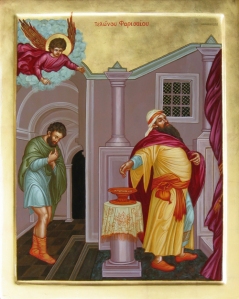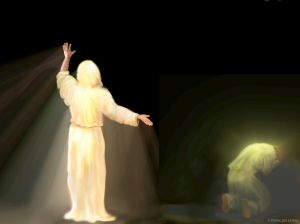“Rocky or Rooted”
Matthew 13:1-9, 18-23
July 16, 2017, First Presbyterian Church of Holt
 Gardening, to my mother, is not a chore. It is a passion. While some dread mowing the lawn, she sits on her back porch, iced tea in hand, plotting out some elaborate pattern she will mow in the grass.
Gardening, to my mother, is not a chore. It is a passion. While some dread mowing the lawn, she sits on her back porch, iced tea in hand, plotting out some elaborate pattern she will mow in the grass.  She knows which flowers need sun, which need shade, which she needs to coach to climb along the trellis. Her gardens are fed mulch, water, and sunshine. My mother has shown me the care, nurture, and love that go into maintaining a garden.
She knows which flowers need sun, which need shade, which she needs to coach to climb along the trellis. Her gardens are fed mulch, water, and sunshine. My mother has shown me the care, nurture, and love that go into maintaining a garden.
 With that in mind the image of the sower is initially a strange one. Here this man known only by his function, “the sower,” and yet he doesn’t seem very intentional about the way that he cares for his seeds. Some fall on the path, some on the rocks, and only some on the good soil. He likely wasn’t a rich man, but rather a tenant farmer working from his scarcity to make life grow. The role of the farmer is not a passive one, but rather requires a working of the land, intentionality in where things are planted, attention given to make sure that the plants get enough water, but not too much.
With that in mind the image of the sower is initially a strange one. Here this man known only by his function, “the sower,” and yet he doesn’t seem very intentional about the way that he cares for his seeds. Some fall on the path, some on the rocks, and only some on the good soil. He likely wasn’t a rich man, but rather a tenant farmer working from his scarcity to make life grow. The role of the farmer is not a passive one, but rather requires a working of the land, intentionality in where things are planted, attention given to make sure that the plants get enough water, but not too much.
 So why then does this sower seem to scatter this seed so broadly? In this parable God is most often cast in the role of the sower as God is the source of life and the origin of the good news, but I’d say for me I see God as more likely being the seeds. God in Christ took root in the world, grew so we might receive the harvest of his grace.
So why then does this sower seem to scatter this seed so broadly? In this parable God is most often cast in the role of the sower as God is the source of life and the origin of the good news, but I’d say for me I see God as more likely being the seeds. God in Christ took root in the world, grew so we might receive the harvest of his grace.  As we read in the first several verses of the Gospel of John: “ In the beginning was the Word, and the Word was with God, and the Word was God. He was in the beginning with God. All things came into being through him, and without him not one thing came into being. What has come into being in him was life, and the life was the light of all people.”
As we read in the first several verses of the Gospel of John: “ In the beginning was the Word, and the Word was with God, and the Word was God. He was in the beginning with God. All things came into being through him, and without him not one thing came into being. What has come into being in him was life, and the life was the light of all people.”
 “The Word was with God and the Word was God,” this means that the Word that was being sown was God. The Word that was being spread was God. And God is famous for being everywhere, even the unexpected places: scorched in the heat, picked apart by the birds, in the rockiest of places. God shows up.
“The Word was with God and the Word was God,” this means that the Word that was being sown was God. The Word that was being spread was God. And God is famous for being everywhere, even the unexpected places: scorched in the heat, picked apart by the birds, in the rockiest of places. God shows up.
What from the outside looks like the sower’s wastefulness, is God’s uncontainable abundance. If what you’re spreading is an extension of God’s own self it’s bound to go everywhere.
 A lot of fear in this world is tied up in scarcity: worries over not enough money, not enough jobs, and not enough time. Even when we look at the less tangible qualities like welcoming and love and compassion it may seem like we need to hold some in reserve, only welcoming those who can offer us something, or perhaps we go the other way only being loving and compassionate to strangers, but not to the ones we see everyday, taking those familiar faces for granted. Sometimes it seems like we believe that the only way to be stewards of the goodness God has extended to us is to guard it carefully, in the fear that others might make what we have and who we are less.
A lot of fear in this world is tied up in scarcity: worries over not enough money, not enough jobs, and not enough time. Even when we look at the less tangible qualities like welcoming and love and compassion it may seem like we need to hold some in reserve, only welcoming those who can offer us something, or perhaps we go the other way only being loving and compassionate to strangers, but not to the ones we see everyday, taking those familiar faces for granted. Sometimes it seems like we believe that the only way to be stewards of the goodness God has extended to us is to guard it carefully, in the fear that others might make what we have and who we are less.
When we are focused on the ways that our lives are lacking, we’re bound to be anxious and discontent. And when we’re living in that sort of space it’s hard to access the kind of imaginative and life-giving vision that energizes us to live into God’s plan for us individually, as a church, and as God’s larger church in the world.
When we seek to point out the inadequacy in our community and in one another over God’s abundance we miss out on God’s Good News for us:
 “For you did not receive a spirit of slavery to fall back into fear, but you have received a spirit of adoption. When we cry, “Abba! Father!” it is that very Spirit bearing witness with our spirit that we are children of God, and if children, then heirs, heirs of God and joint heirs with Christ—if, in fact, we suffer with him so that we may also be glorified with him.”
“For you did not receive a spirit of slavery to fall back into fear, but you have received a spirit of adoption. When we cry, “Abba! Father!” it is that very Spirit bearing witness with our spirit that we are children of God, and if children, then heirs, heirs of God and joint heirs with Christ—if, in fact, we suffer with him so that we may also be glorified with him.”
It can be both painful and convicting if we stop to consider what sort of environment it is we provide for God to grow in and among us.
 Maybe we’re the path, hard packed into a set pattern of how we’ve always done things, entertaining the presence of new growth from time to time, but more interested in keeping it all together than in being changed by something new.
Maybe we’re the path, hard packed into a set pattern of how we’ve always done things, entertaining the presence of new growth from time to time, but more interested in keeping it all together than in being changed by something new.
As Protestants we affirm the adage “reformed and always being reformed according to the Word of God,” but change can be hard, especially when we feel like we have everything all figured out. A path is by definition a comfortable route, worn down over time by person after person deciding that that is the way to go. While it can be a comfort for those who travel have helped to travel that path, new growth in that space would require a rerouting, a disruption of what is known for the sake of the unknown. A new seed has no chance on a hard packed path unless one will make a space for it to take root, and will water the dirt that has become dusty from it’s barrenness. And as we see in the parable, an exposed seed is vulnerable and easily snatched away by the bird that will consume it.
 Perhaps we’re the rocky soil, binding ourselves to what we are comfortable with and in doing so creating an impenetrable rocky border between ourselves and all that are on the outside. We leave room for others to come near, but like the rocky soil we don’t allow for roots to form, and those new and challenging things are unable to stay long enough for any stability or lasting growth.
Perhaps we’re the rocky soil, binding ourselves to what we are comfortable with and in doing so creating an impenetrable rocky border between ourselves and all that are on the outside. We leave room for others to come near, but like the rocky soil we don’t allow for roots to form, and those new and challenging things are unable to stay long enough for any stability or lasting growth.
 I would hope that we would not be the thorny patch! Lack of growth on the part of the thorns is not the issue here, they themselves are growing, but their growth serves to keep others out, and chokes the other plants that grow there. Thorns are focused only on their own agenda and growth, but do not seek to serve others, rather they curl in on themselves in a tangled mess.
I would hope that we would not be the thorny patch! Lack of growth on the part of the thorns is not the issue here, they themselves are growing, but their growth serves to keep others out, and chokes the other plants that grow there. Thorns are focused only on their own agenda and growth, but do not seek to serve others, rather they curl in on themselves in a tangled mess.
 Ideally, of course, we would be the good soil, the most hospitable of the parable’s environments. The good soil provides nourishment and support. When the seeds fall on it they help each other to grow abundantly, providing stability to the soil, shade in turn for one another. By growing together these seeds each only bear a little bit of the burden of the outside environment. And as our parable illustrates, these seeds multiply in their growth yielding abundance!
Ideally, of course, we would be the good soil, the most hospitable of the parable’s environments. The good soil provides nourishment and support. When the seeds fall on it they help each other to grow abundantly, providing stability to the soil, shade in turn for one another. By growing together these seeds each only bear a little bit of the burden of the outside environment. And as our parable illustrates, these seeds multiply in their growth yielding abundance!
 Why does God waste God’s time being out among the rocks and the path and laid out as food for the birds? Because there is an abundance that springs forth wherever God takes root. This is the promise of our text and the prophecy of Isaiah:
Why does God waste God’s time being out among the rocks and the path and laid out as food for the birds? Because there is an abundance that springs forth wherever God takes root. This is the promise of our text and the prophecy of Isaiah:
 “For as the rain and the snow come down from heaven, and do not return there until they have watered the earth, making it bring forth and sprout, giving seed to the sower and bread to the eater, so shall my word be that goes out from my mouth; it shall not return to me empty, but it shall accomplish that which I purpose, and succeed in the thing for which I sent it For you shall go out in joy, and be led back in peace; the mountains and the hills before you shall burst into song, and all the trees of the field shall clap their hands. Instead of the thorn shall come up the cypress; instead of the brier shall come up the myrtle; and it shall be to the Lord for a memorial, for an everlasting sign that shall not be cut off.”
“For as the rain and the snow come down from heaven, and do not return there until they have watered the earth, making it bring forth and sprout, giving seed to the sower and bread to the eater, so shall my word be that goes out from my mouth; it shall not return to me empty, but it shall accomplish that which I purpose, and succeed in the thing for which I sent it For you shall go out in joy, and be led back in peace; the mountains and the hills before you shall burst into song, and all the trees of the field shall clap their hands. Instead of the thorn shall come up the cypress; instead of the brier shall come up the myrtle; and it shall be to the Lord for a memorial, for an everlasting sign that shall not be cut off.”
 When the seed we are sowing is God’s own self, we can be secure in the knowledge that it will grow beyond our wildest expectations. God seeks to bless us richly, to take root in our church, in our homes, in our lives, and in our very hearts. By commissioning all who follow Christ as God’s disciples, as “joint heirs with Christ,” each of us are entrusted with that which is most precious, God’s own self. But unlike many precious resources, God’s goodness is multiplied when shared, the hope of Christ expands in the hearts of those who receive it. God’s word can only bear fruit when we scatter it broadly in all places, even and perhaps especially those who do not seem deserving.
When the seed we are sowing is God’s own self, we can be secure in the knowledge that it will grow beyond our wildest expectations. God seeks to bless us richly, to take root in our church, in our homes, in our lives, and in our very hearts. By commissioning all who follow Christ as God’s disciples, as “joint heirs with Christ,” each of us are entrusted with that which is most precious, God’s own self. But unlike many precious resources, God’s goodness is multiplied when shared, the hope of Christ expands in the hearts of those who receive it. God’s word can only bear fruit when we scatter it broadly in all places, even and perhaps especially those who do not seem deserving.
 While we should treat the love and care of Christ as precious, it is not scarce, but limitless. Paul writes to the Corinthians, “For the love of Christ urges us on, because we are convinced that one has died for all; therefore all have died. And he died for all, so that those who live might live no longer for themselves, but for him who died and was raised for them.” Christ died for all to extend grace to all. Might we share this grace so that others may grow in this truth. Amen.
While we should treat the love and care of Christ as precious, it is not scarce, but limitless. Paul writes to the Corinthians, “For the love of Christ urges us on, because we are convinced that one has died for all; therefore all have died. And he died for all, so that those who live might live no longer for themselves, but for him who died and was raised for them.” Christ died for all to extend grace to all. Might we share this grace so that others may grow in this truth. Amen.
